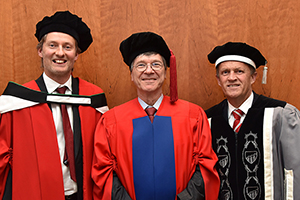Latest News Archive
Please select Category, Year, and then Month to display items
08 May 2024
|
Story Anthony Mthembu
|
Photo SUPPLIED
 From left to right: Prof Philippe Burger, Dean of the Faculty of Economic and Management Sciences (EMS) at the University of the Free State (UFS), presenting an award to Ntswaki Moshwaisi.
From left to right: Prof Philippe Burger, Dean of the Faculty of Economic and Management Sciences (EMS) at the University of the Free State (UFS), presenting an award to Ntswaki Moshwaisi.
A cohort of esteemed academic and support staff from the Faculty of Economic and Management Sciences (EMS) at the University of the Free State (UFS), received well-deserved accolades at the 2024 annual EMS Awards. Notable among them were Programme Coordinator Ntswaki Moshwaisi and Associate Professor Prof Liezel Massyn from the UFS Business School.
Prof Massyn was lauded in the Teaching and Learning category, while Moshwaisi garnered recognition in the Support Staff category at the awards ceremony held on 18 April 2024, on the UFS Bloemfontein campus.
Reflecting on her achievement, Moshwaisi expressed gratitude, stating, “The award serves as motivation to myself to keep working hard and to innovate methods and approaches towards my work.’’
The significance of the awards
Prof Massyn remarked that the awards serve to spotlight the remarkable contributions of both academics and support staff within the faculty. She considers the award as a testament to her dedication, acknowledged by her esteemed colleagues. Both Prof Massyn and Moshwaisi attribute their success to the support they receive from their peers.
Moreover, they emphasise that these awards transcend mere recognition. It will serve as an impetus to the way forward. Moshwaisi envisages leveraging her award to enhance the quality and efficacy of the programmes under her stewardship. Prof Massyn, echoing this statement, asserts, ’’It will strengthen my belief in the transformative power of teaching and make me work harder to provide quality learning opportunities to students. I am a firm believer in following an evidence-based approach and will continue to research learning and teaching.’’
Prof Jeffrey Sachs presented with honorary doctorate at Spring Graduation Ceremony
2015-10-01

Prof Jeffrey Sachs (centre) with Prof Philippe Burger,
Head of Department: Economics (left), and
Prof HJ Kroukamp, Dean of the Faculty of Economic and
Management Sciences (right).
Photo: Charl Devenish |
“Quality education is the best accelerator for sustainable growth. Universities have a unique role to play in this regard,” Prof Jeffrey Sachs said during a lecture he presented at the University of the Free State (UFS) Faculty of Economic and Management Sciences. He gave an insightful overview of the new Sustainable Development Goals (SDGs) of the United Nations. The 17 SDGs replace the Millennium Development goals of the past 15 years. In a major achievement, 193 countries will sign the goals at the United Nations (UN) in New York on 25 September 2015.
Prof Sachs is the director of The Earth Institute, Quetelet professor of Sustainable Development, and professor of Health Policy and Management at Columbia University. He is also a special advisor to the UN Secretary-General Ban Ki-moon on the Millennium Development Goals, and director of the UN Sustainable Development Solutions Network. Another accolade now added to his résumé is an honorary doctorate in Economics conferred on him by the UFS at the Spring Graduation Ceremony on 17 September 2015 for outstanding achievements and contribution to academia.
“South Africa is not achieving sustainable development. It has the highest inequality in the world with high unemployment among the youth. Quality education is the best accelerator for growth,” Prof Sachs said. He used the high education investment in Korea as an example of that country’s growth. Prof Sachs added that the government cannot achieve the SDGs on its own. “It is important for the country and universities to take on the goals. Universities can apply pressure, influence and provide solutions.”